Fleurs du Mal Magazine


Or see the index

The Deceased
He was a reprobate I grant,
and always liquired till his money went.
His hair depended on a noose from
his pale brow, his eyes were dumb.
Like prisoners in their cavernous slots were
settled in attitudes of despair.
You who God bless you never sunk so low
censure and pray for him that he was so.
And with his failings you regret the verses
the fellow made, proberly between curses,
proberly in the extreames of moral decay
but he wrote them in a sincere way.
And seems to have felt a sort of pain
to which your imagination can not attain!
Keith Douglas
(1920 – 1944)
The Deceased
• fleursdumal.nl magazine
More in: Archive C-D, Archive C-D, Douglas, Keith, WAR & PEACE
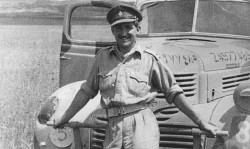
How to Kill
Under the parabola of a ball,
a child turning into a man,
I looked into the air too long.
The ball fell in my hand, it sang
in the closed fist: Open Open
Behold a gift designed to kill.
Now in my dial of glass appears
the soldier who is going to die.
He smiles, and moves about in ways
his mother knows, habits of his.
The wires touch his face: I cry
NOW. Death, like a familiar, hears
and look, has made a man of dust
of a man of flesh. This sorcery
I do. Being damned, I am amused
to see the centre of love diffused
and the wave of love travel into vacancy.
How easy it is to make a ghost.
The weightless mosquito touches
her tiny shadow on the stone,
and with how like, how infinite
a lightness, man and shadow meet.
They fuse. A shadow is a man
when the mosquito death approaches.
Keith Douglas
(1920 – 1944)
How to Kill
• fleursdumal.nl magazine
More in: Archive C-D, Archive C-D, Douglas, Keith, WAR & PEACE
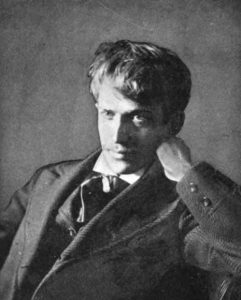
Death
A spirit sped
Through spaces of night;
And as he sped, he called,
“God! God!”
He went through valleys
Of black death-slime,
Ever calling,
“God! God!”
Their echoes
From crevice and cavern
Mocked him:
“God! God! God!”
Fleetly into the plains of space
He went, ever calling,
“God! God!”
Eventually, then, he screamed,
Mad in denial,
“Ah, there is no God!”
A swift hand,
A sword from the sky,
Smote him,
And he was dead.
Stephen Crane
(1871 – 1900)
Death. A spirit sped
•fleursdumal.nl magazine
More in: *War Poetry Archive, Archive C-D, Archive C-D, Stephen Crane

Vergissmeinnicht
(Forget-me-not))
Three weeks gone and the combatants gone
returning over the nightmare ground
we found the place again, and found
the soldier sprawling in the sun.
The frowning barrel of his gun
overshadowing. As we came on
that day, he hit my tank with one
like the entry of a demon.
Look. Here in the gunpit spoil
the dishonoured picture of his girl
who has put: Steffi. Vergissmeinnicht.
in a copybook gothic script.
We see him almost with content,
abased, and seeming to have paid
and mocked at by his own equipment
that’s hard and good when he’s decayed.
But she would weep to see today
how on his skin the swart flies move;
the dust upon the paper eye
and the burst stomach like a cave.
For here the lover and killer are mingled
who had one body and one heart.
And death who had the soldier singled
has done the lover mortal hurt.
Keith Douglas
(1920 – 1944)
Vergissmeinnicht (Forget-me-not)
• fleursdumal.nl magazine
More in: Archive C-D, Archive C-D, Douglas, Keith, WAR & PEACE
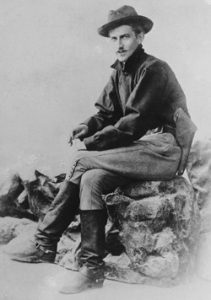
I saw a man
pursuing the horizon
I saw a man pursuing the horizon;
Round and round they sped.
I was disturbed at this;
I accosted the man.
“It is futile,” I said,
“You can never —”
“You lie,” he cried,
And ran on.
Stephen Crane
(1871 – 1900)
I saw a man pursuing the horizon
• fleursdumal.nl magazine
More in: *War Poetry Archive, Archive C-D, Archive C-D, Stephen Crane

Simplify Me When I’m Dead
Remember me when I am dead
and simplify me when I’m dead.
As the processes of earth
strip off the colour of the skin:
take the brown hair and blue eye
and leave me simpler than at birth,
when hairless I came howling in
as the moon entered the cold sky.
Of my skeleton perhaps,
so stripped, a learned man will say
“He was of such a type and intelligence,” no more.
Thus when in a year collapse
particular memories, you may
deduce, from the long pain I bore
the opinions I held, who was my foe
and what I left, even my appearance
but incidents will be no guide.
Time’s wrong-way telescope will show
a minute man ten years hence
and by distance simplified.
Through that lens see if I seem
substance or nothing: of the world
deserving mention or charitable oblivion,
not by momentary spleen
or love into decision hurled,
leisurely arrive at an opinion.
Remember me when I am dead
and simplify me when I’m dead.
Keith Douglas
(1920 – 1944)
Simplify Me When I’m Dead
• fleursdumal.nl magazine
More in: Archive C-D, Archive C-D, Douglas, Keith, WAR & PEACE

The Knife
Can I explain this to you? Your eyes
are entrances the mouths of caves
I issue from wonderful interiors
upon a blessed sea and a fine day,
from inside these caves I look and dream.
Your hair explicable as a waterfall
in some black liquid cooled by legend
fell across my thought in a moment
became a garment I am naked without
lines drawn across through morning and evening.
And in your body each minute I died
moving your thigh could disinter me
from a grave in a distant city:
your breasts deserted by cloth, clothed in twilight
filled me with tears, sweet cups of flesh.
Yes, to touch two fingers made us worlds
stars, waters, promontories, chaos
swooning in elements without form or time
come down through long seas among sea marvels
embracing like survivors in our islands.
This I think happened to us together
though now no shadow of it flickers in your hands
your eyes look down on ordinary streets
If I talk to you I might be a bird
with a message, a dead man, a photograph.
Keith Douglas
(1920 – 1944)
The Knife
• fleursdumal.nl magazine
More in: Archive C-D, Archive C-D, Douglas, Keith, WAR & PEACE

Do not weep, maiden, for war is kind
Do not weep, maiden, for war is kind.
Because your lover threw wild hands toward the sky
And the affrighted steed ran on alone,
Do not weep.
War is kind.
Hoarse, booming drums of the regiment,
Little souls who thirst for fight,
These men were born to drill and die.
The unexplained glory flies above them,
Great is the battle-god, great, and his kingdom—
A field where a thousand corpses lie.
Do not weep, babe, for war is kind.
Because your father tumbled in the yellow trenches,
Raged at his breast, gulped and died,
Do not weep.
War is kind.
Swift, blazing flag of the regiment,
Eagle with crest of red and gold,
These men were born to drill and die.
Point for them the virtue of slaughter,
Make plain to them the excellence of killing
And a field where a thousand corpses lie.
Mother whose heart hung humble as a button
On the bright splendid shroud of your son,
Do not weep.
War is kind.
Stephen Crane
(1871 – 1900)
Do not weep, maiden, for war is kind
from: War is Kind
•fleursdumal.nl magazine
More in: *War Poetry Archive, Archive C-D, Archive C-D, Stephen Crane

Oxford
At home as in no other city, here
summer holds her breath in a dark street
the trees nocturnally scented, lovers like moths
go by silently on the footpaths
and spirits of the young wait,
cannot be expelled, multiply each year.
In the meadows, walks, over the walls
the sunlight, far-travelled, tired and content,
warms the recollections of old men, touching
the hand of the scholar on his book, marching
through quadrangles and arches, at last spent
it leans through the stained windows and falls.
This then is the city of young men, of beginning,
ideas, trials, pardonable follies,
the lightness, seriousness and sorrow of youth.
And the city of the old, looking for truth,
browsing for years, the mind’s seven bellies
filled, become legendary figures, seeming
stones of the city, her venerable towers;
dignified, clothed by erudition and time.
For them it is not a city but an existence;
outside which everything is a pretence:
within, the leisurely immortals dream,
venerated and spared by the ominous hours.
Keith Douglas
(1920 – 1944)
Oxford
• fleursdumal.nl magazine
More in: # Classic Poetry Archive, Archive C-D, Archive C-D, Douglas, Keith, WAR & PEACE

Desert Flowers
Living in a wide landscape are the flowers –
Rosenberg I only repeat what you were saying –
the shell and the hawk every hour
are slaying men and jerboas, slaying
the mind: but the body can fill
the hungry flowers and the dogs who cry words
at nights, the most hostile things of all.
But that is not new. Each time the night discards
draperies on the eyes and leaves the mind awake
I look each side of the door of sleep
for the little coin it will take
to buy the secret I shall not keep.
I see men as trees suffering
or confound the detail and the horizon.
Lay the coin on my tongue and I will sing
of what the others never set eyes on.
Keith Douglas
(1920 – 1944)
Desert Flowers
• fleursdumal.nl magazine
More in: Archive C-D, Archive C-D, Douglas, Keith, WAR & PEACE
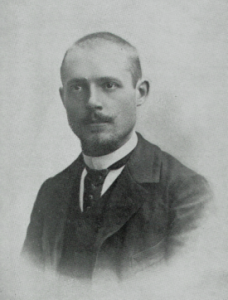
Paris double galère
Depuis le Point-du-Jour jusqu’aux cèdres bibliques
Double galère assise au long du grand bazar,
Et du grand ministère, et du morne alcazar,
Parmi les deuils privés et les vertus publiques ;
Sous les quatre-vingts rois et les trois Républiques,
Et sous Napoléon, Alexandre et César,
Nos pères ont tenté le centuple hasard,
Fidèlement courbés sur tes rames obliques.
Et nous prenant leur place au même banc de chêne,
Nous ramerons des reins, de la nuque, de l’âme,
Pliés, cassés, meurtris, saignants sous notre chaîne ;
Et nous tiendrons le coup, rivés sur notre rame,
Forçats fils de forçats aux deux rives de Seine,
Galériens couchés aux pieds de Notre Dame.
Charles Péguy
(1873 – 1914)
Paris double galère
1913
• fleursdumal.nl magazine
More in: # Classic Poetry Archive, Archive O-P, Archive O-P, FDM in Paris, Peguy, Charles, WAR & PEACE
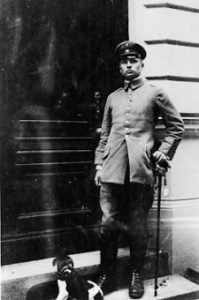
Gedicht über Nachtwirkungen
Noch nicht Tag! Die fratzenhafte Nacht
hat mich Stück für Stück entzweigerissen.
Wehe Striemen drücken mir die Kissen,
jede Falte hat mich wund gemacht.
Und der Träume quälerische Schwere:
Wollust, Ekel, Schmerzen, Tränen, Mord,
treibt mein Herz auf einem dunklen Meere
wie ein purpurrotes Segel fort.
Bin ein zitternd Geflecht von Nerven,
allem Bösen in die Hand gegeben,
Und die Schatten sind wie Messerschärfen,
die von meinem Zucken trunken leben.
Und ich möchte in das Dunkel schrein.
Aber meine Stimme ist nicht mehr.
Wilder Bilder ewige Wiederkehr,
stumm, gestaltlos, haltlos muss ich sein!
Hans Ehrenbaum-Degele
(1889 – 1915)
Gedicht über Nachtwirkungen
• fleursdumal.nl magazine
More in: #Experimental Poetry Archive, *War Poetry Archive, - Archive Tombeau de la jeunesse, Archive E-F, Archive E-F, Expressionism, Modernisme
Thank you for reading Fleurs du Mal - magazine for art & literature